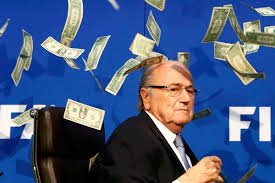By Andrew Warshaw
March 14 – Several months after upholding a six-year ban on Sepp Blatter, bringing an inglorious end to the colourful and controversial career of the former FIFA president, the Court of Arbitration has rubbed salt in his wounds with an unwanted belated 81st birthday present.
Blatter was banned initially for eight years by FIFA’s ethics committee for that now infamous “disloyal payment” to Michel Platini. Even after the sanction was reduced on appeal to six years, Blatter tried to clear his name by going to CAS last summer, insisting that the CHF 2 million payment was an oral gentleman’s agreement. .
But now sport’s highest court, in a detailed summary of its reasoning, has explained why it threw out Blatter’s case describing him as “reckless” by unlawfully creating a pension fund for his former protégé.
Ethics prosecutors have long argued that a private oral contract between the two most powerful officials in world football was invalid since the agreement did not pass through, or have the knowledge of, the relevant decision-making bodies.
The three CAS judges agreed, saying that Platini, who had a separate written contract back in 1999, had no right to receive additional backdated salary in 2011 for working as Blatter’s presidential adviser from 1998-2002.
“The credit awarded to Mr. Platini … amounted to a gift as he was not entitled to such credit,” the three judges said, concluding that a six-year ban for Blatter, who turned 81 last week, is “not disproportionate and, indeed, reasonable and fair.”
In its ruling, CAS also noted the “habitual” bonus culture of FIFA at the time of the World Cup hosting ballot in December 2010, when Russia was awarded the 2018 tournament and Qatar was handed the 2022 edition.
“It must be recalled that Mr Blatter as FIFA president was the top person in the world of football. There is no higher position in football, and the FIFA president must especially be aware of and conduct himself in accordance with his duties and responsibilities under the FCE (FIFA code of ethics). The standard of ethical conduct required under the FCE should be, and should be seen to be, applied to the FIFA President as rigorously, (and) if not more rigorously, than that applied to anyone else bound by the FCE.”
“The Panel considers Mr. Blatter’s conduct in the matter as FIFA President reckless, or at least profoundly careless, as he approved the payment without checking the written contract, without asking his employees for the written contract to be checked or doing any verification whatsoever,” the judges said.
Although Platini received a lower ban of four years – also on appeal – the Frenchman stood to lose far more since it halted his FIFA presidential bid in its tracks as well as forcing him to resign as head of UEFA.
Platini had joined the FIFA Executive Committee in 2003, which meant he was entitled to pension scheme rewarding each year of service. But CAS said Blatter created a fund for his former protege of $2.6 million in 2015 instead of the $1.52 million that was due.
The fact that the CHF 2 million was for work Platini carried out when he served as a technical adviser to Blatter and that he did not receive his money until 2011 when Blatter was seeking re-election raised obvious questions.
“The Panel believes that the truth lies in Mr Blatter’s statement that he thought it was a debt that needed to be paid,” said the panel. “Although Mr Blatter may well have been truthful in this belief, that he thought there was a debt of some kind, the fact is that this was not a debt of FIFA and FIFA did not owe the CHF2 million to Mr Platini. Since there was no obligation for FIFA to pay this amount to Mr Platini, the Panel finds that the payment cannot be denominated otherwise than a gift, regardless of why Mr Blatter considered he had a debt to Mr Platini.”
Contact the writer of this story at moc.l1745133514labto1745133514ofdlr1745133514owedi1745133514sni@w1745133514ahsra1745133514w.wer1745133514dna1745133514
